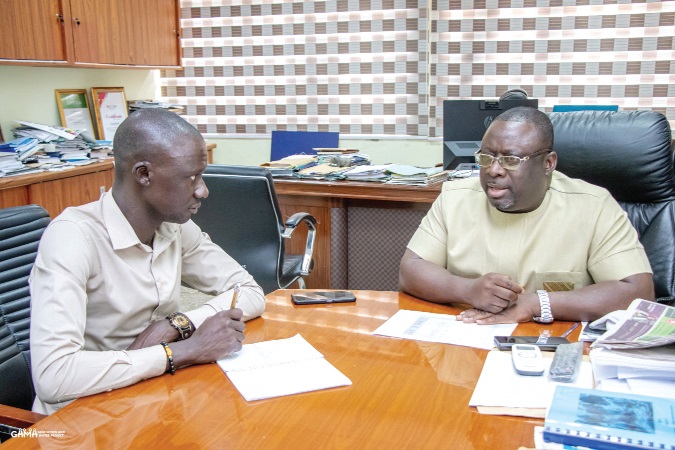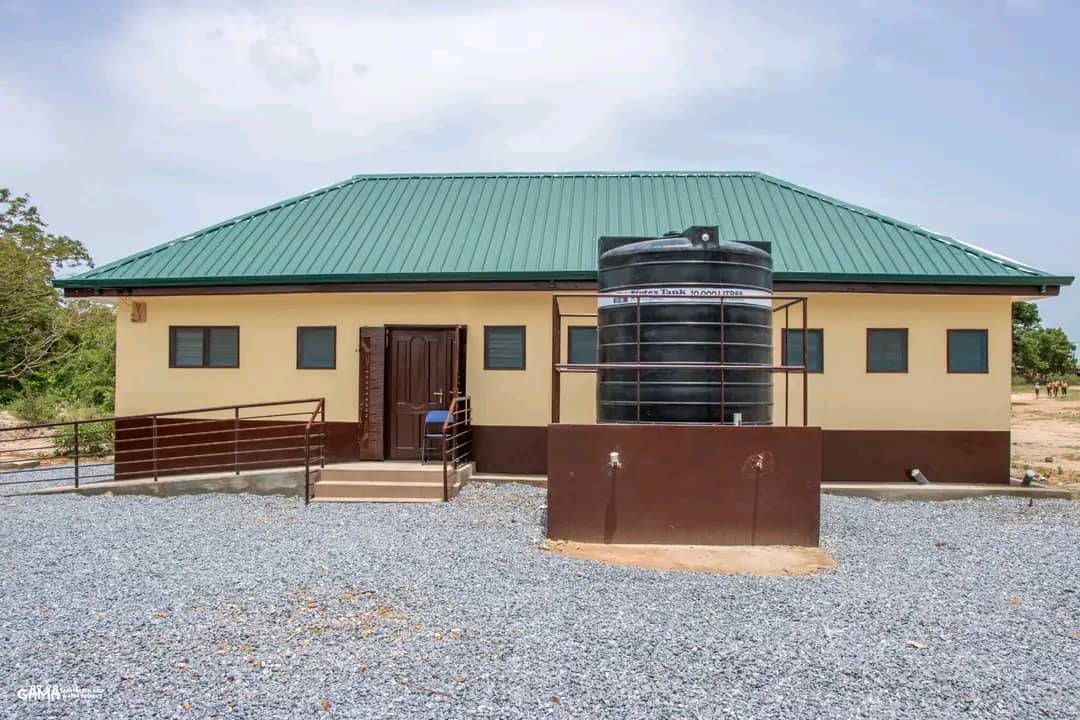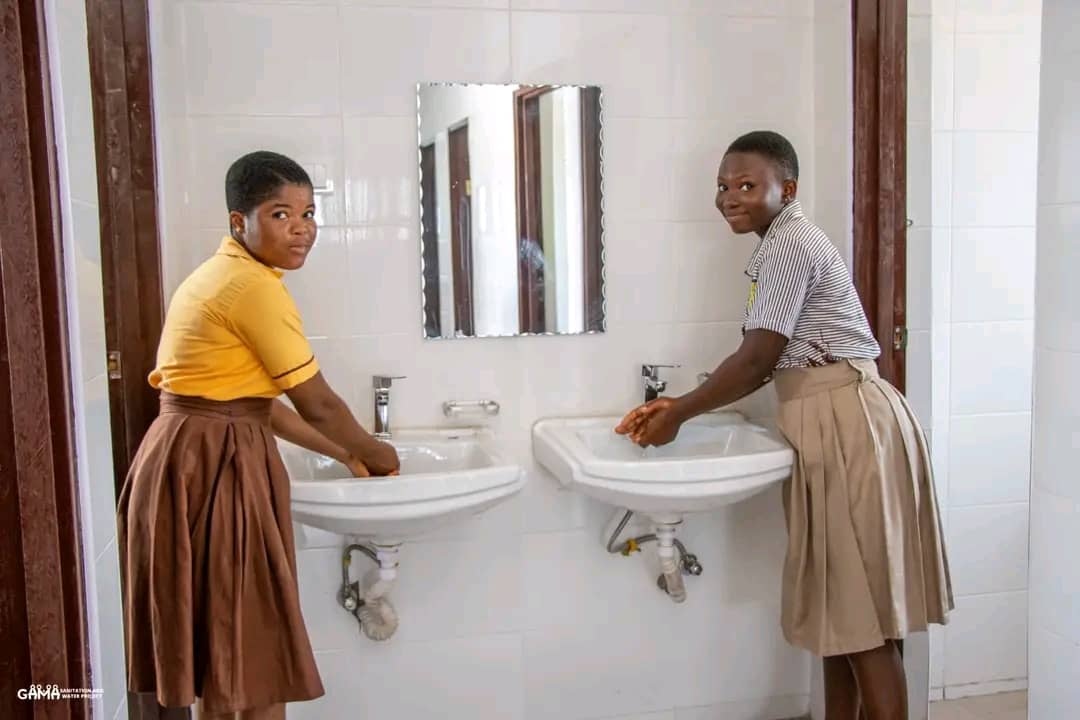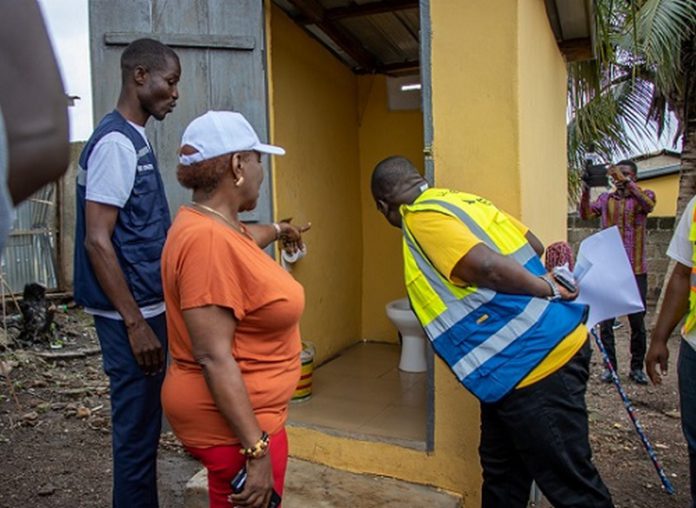“When an ‘Oba’ (paramount chief) stops the procession and squats by the wayside, it’s on an urgent matter that spares neither king nor god…”
The above quotation from Noble Laureate in Literature, Wole Soyinka, sums up the importance of the million-cedi question of where do you respond when nature calls.
Will it be in the bushes, at the beach, the public lavatory or in the comfort of your home? Most Ghanaians also seek answers to it, as only 25.3 per cent of the population had access to improved sanitation that is not shared, says the 2021 Population and Housing Census.
The report indicates that about 17.7 per cent of Ghanaians still practise open defecation.
For 87-year-old Ex-Sgt K. Afriyie, a resident of Atwima Denkyembuoso in the Ashanti Region, anytime nature posed this question it was double agony for him. There must be someone to carry him at the back like a baby to a public lavatory to empty his bowels.
“My father suffered stroke and cannot walk; anytime he has to visit the toilet, I need to be around to carry him on my back to a public facility. It was so dehumanising but we had no option,” Emmanuel Darko, son of the retired army officer, recounted the experience to the Daily Graphic.
Apart from the stench the father and son had to endure at the unkempt public lavatory, their economic challenges worsened because Mr Darko could not work due to the father’s sedentary condition.
However, ever since they switched to the household lavatory provided under the Greater Kumasi Metropolitan Area (GKMA) project, the story has changed.
“This new toilet is so tidy and easy to use; so my father uses it on his own. I am able to go to work without thinking about how my father will respond to the call of nature,” Mr Darko stated.
After many years of attending to the call of nature on a pit latrine, Gladys Manu, a kenkey seller, also at Atwima Techiman, has also fallen heads over heels for the GKMA household toilet.
“In the previous house I rented, we used pit latrine which was a death trap. Apart from the offensive smell that emanated from it, I always feared that my children could fall into the pit.
But there is a GKMA household toilet in my new place. We do not go out to use any pit latrine anymore,” she said.
The experiences of Sgt. Afriyie, Mr Darko and Ms Manu sum up what thousands of people who have had access to improved lavatory and sanitation facilities through the Greater Accra Metropolitan Area Sanitation and Water Project (GAMA-SWP) and its replica, the GKMA project feel.
GAMA-SWP
The GAMA-SWP is a $150-million World Bank grant initiative which started in August, 2014 to support the government’s efforts to increase access to improved sanitation and water supply in the GAMA, with emphasis on low-income communities.
The success of the GAMA-SWP has contributed to improved sanitation situation in the country over the last seven years.
Within the period, the country has improved access to toilets from 23 per cent to 59.3 per cent.
“As of 2015, the situation was bad, with access to toilet facilities across the country ranging around 15 per cent, while 60 per cent of the population was using shared toilet facilities, which was not good at all,” the National Coordinator of the project, George Asiedu, said.
“The 2021 PHC figures show that we have come far by increasing access to toilet facilities to 59.3 per cent and reduced the usage of public toilets to 23 per cent. Open defecation also reduced from 8.2 per cent to 6.2 per cent; and this is good,” he added.
That assertion is supported by the 2021 Population and Housing Census (PHC) conducted by the Ghana Statistical Service (GSS) which showed that toilet coverage in Ghana had hit 59.3 per cent, with public toilets accounting for 23 per cent, while 17 per cent had no toilets.

George Asiedu (right), National Coordinator of the GAMA-SWP, sharing a point with Daily Graphic’s Timothy Ngnenbe
Components
The project has four components – providing environmental sanitation and water supply services to priority low-income areas of the GAMA; improvement and expansion of the water distribution network in the GAMA; planning, improvement and expansion of GAMA-wide environmental sanitation services; and the institutional strengthening of municipal, metropolitan and national institutions.
The initial target of the project was to construct 19,100 household toilets and extend water connections to 250,000 households in low-income communities by May, 2020.
Under the GAMA-SWP, residents of the metropolitan, municipal and district assemblies (MMDAs) within GAMA were given the opportunity to acquire a household toilet at 50 per cent subsidy.

19-seater toilet facilities constructed by GAMA-SWP at the Katamanso Cluster of schools in the Kpone Municipality.
Hence, with as low as GH¢1,100 the beneficiary got the full package of a toilet room, seat, hand wash basin, a biofil digester and a discharge unit (soak-away).
For those who already had their rooms, they got the other items at GH¢600.
Statistics at the GAMA-SWP Secretariat show that at the close of the project in December 2020, 28,541 household toilets were constructed in excess of the 19,100 targeted.
Also, 406 units of institutional toilets were constructed in 250 schools, reaching over 200,000 students.
For the improved water supply component, which was spearheaded by the Ghana Water Company Limited (GCWL), the records show that the project extended water supply services to 10,400 households in low-income communities, exceeding the target to reach 2,500 households.
Following the successful implementation of the GAMA-SWP in Accra, the World Bank gave additional funding of $125 million to extend the project to the Greater Kumasi Metropolitan Area (GKMA) and add more toilets in GAMA.
Under the additional funding arrangement, 30,000 household toilets are to be provided at GKMA and 12,000 in GAMA by the end of December, 2024.

Some pupils of the Katamanso Cluster of schools in the Kpone Municipality, washing their hands in one of the GAMA toilets.
Success story
When the Daily Graphic contacted the GAMA-SWP Secretariat for updates on the project, it came to light that Sgt. Afriyie and Ms Manu were part of over 405,000 beneficiaries in 50,689 households that had been provided with the facility in low-income communities across GAMA and GKMA.
Giving a breakdown of the figure, the National Coordinator of the project said 41,337 toilets had been provided in GAMA, while 9,352 had also been provided at GKMA.
Mr Asiedu explained that with 18 months to the end of the second financing phase, 12,796 household toilets had been produced, thus, exceeding the 12,000 target for that phase.
For GKMA, he said the 9,352 household lavatories constructed so far meant that 20,648 more of those facilities would have to be constructed within 18 months.
“This is achievable because we are now doing 1,200 toilets per month; so, we hope to achieve this target by the closing date of December 2024,” he added.
Mr Asiedu said apart from household toilets, 471 units of school toilets and sanitation facilities had been provided for schools within GAMA.
“For GKMA, we are supposed to provide 120 school sanitation and health facilities, but as we speak, we have 129 of them under various stages of completion and expected to be completed by November this year,” he said.
Mr Asiedu added that a simplified sewerage network comprising 51 kilometres (km) of sewer lines and a new wastewater treatment plant with a capacity of 1,800 cubic metres (m3) per day had been completed to serve 4,805 households in Ashaiman.
In terms of water supply, 282 kilometres of pipelines have been laid under the water component of the project, resulting in the increase in access to sustainable water services to over 420,000 people in 85,000 households in GAMA, the data pointed out.
While commending Ghana for the modest gains made in access to toilet and water under the GAMA-SWP over the last few years, the Global Director for Water Practices at the World Bank Group, Saroj Kumar Jha, called on the country to prioritise local mobilisation of funds to finance water, sanitation and hygiene (WASH) services.
He said the success story of the GAMA-SWP showed that when the country invested more in the WASH sector, it could utilise the power of water resources to transform social development.
The country last week launched the Ghana water, sanitation and hygiene sector development programme (GWASHSDP).
The 10-year initiative (2021-2030) is to help achieve universal basic WASH services by 2030 in line with Sustainable Development Goal (SDG) Six.
The Minister of Sanitation and Water Resources, Cecilia Abena Dapaah, said the GAMA-SWP had contributed to improving access to basic water and sanitation services in the country.
“Currently, the population with access to basic drinking water services has increased from 79 per cent in 2017-2018 to 87.7 per cent in 2021. The population with access to improved toilet facilities, including public toilets, has also increased from 66 per cent to 80.8 per cent within the same period,” she said.
Ms Dapaah stated that GWASHSDP would help to consolidate the gains made under the GAMA-SWP and rally WASH sector stakeholders towards achieving SDG Six.
She added that the government’s $1.4 billion investment in WASH projects nationwide would extend access to those facilities to at least 5.3 million people.
To ensure that more residents within GKMA get access to household toilets, just like Sgt. Afriyie and Ms Manu, the GAMA-SWP national coordinator said efforts were being made to ramp up the construction of the facilities.
“Currently, we are getting an average of 1,300 full payments for household toilets on monthly basis at GKMA, but we are able to provide 1,100, leaving a backlog of 200 that has to be moved forward to the next month. We are recruiting more contractors to be able to meet the monthly demand,” Mr Asiedu said.
He added that under the GWASHSDP, a follow-up project was being developed to scale up the toilet projects to other parts of the country to ensure that all citizens had access to improved toilets.
Mr Asiedu called on MMDAs to provide the needed infrastructure for waste disposal, saying “the MMDAs should provide incentives for disposing them”.

